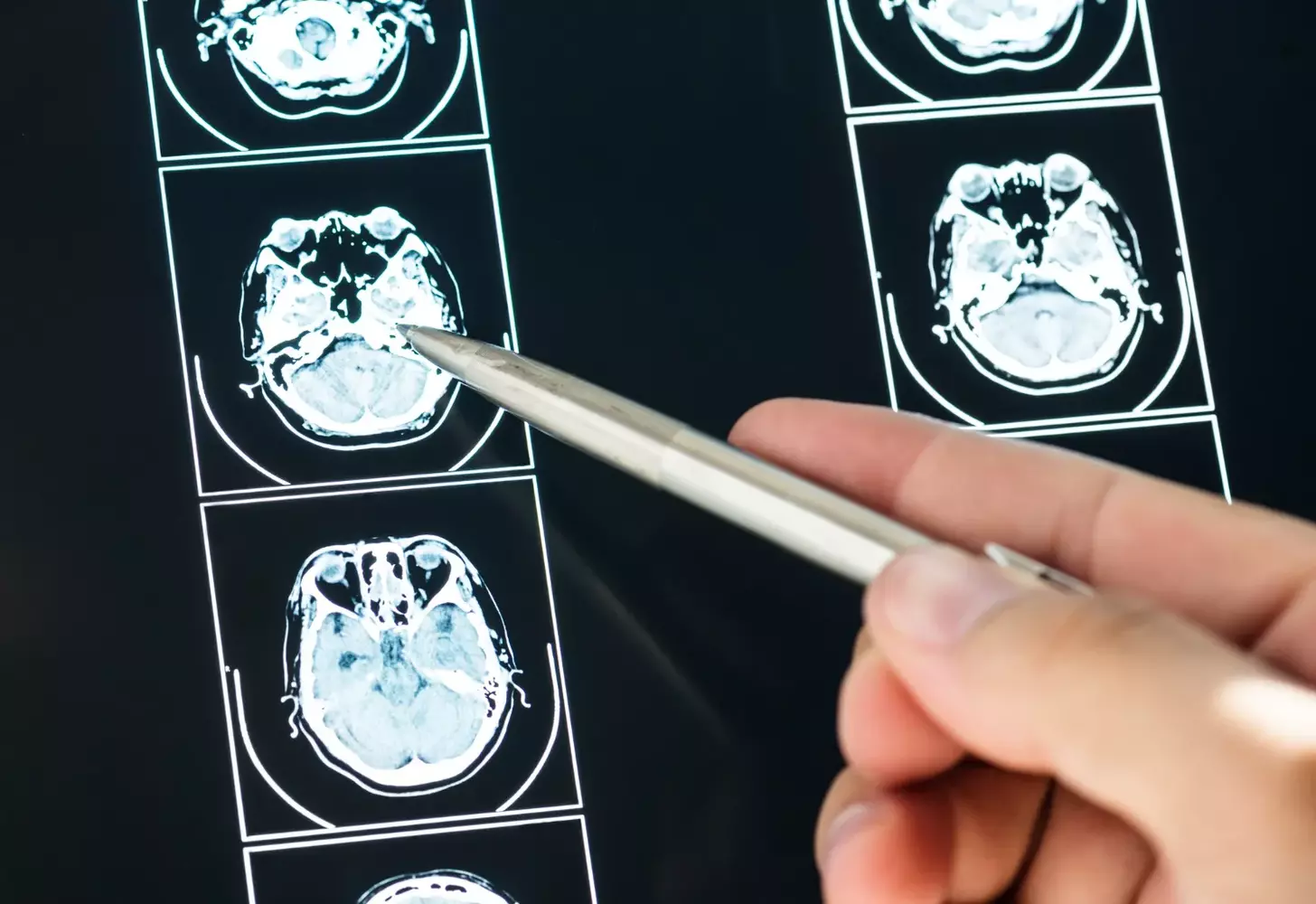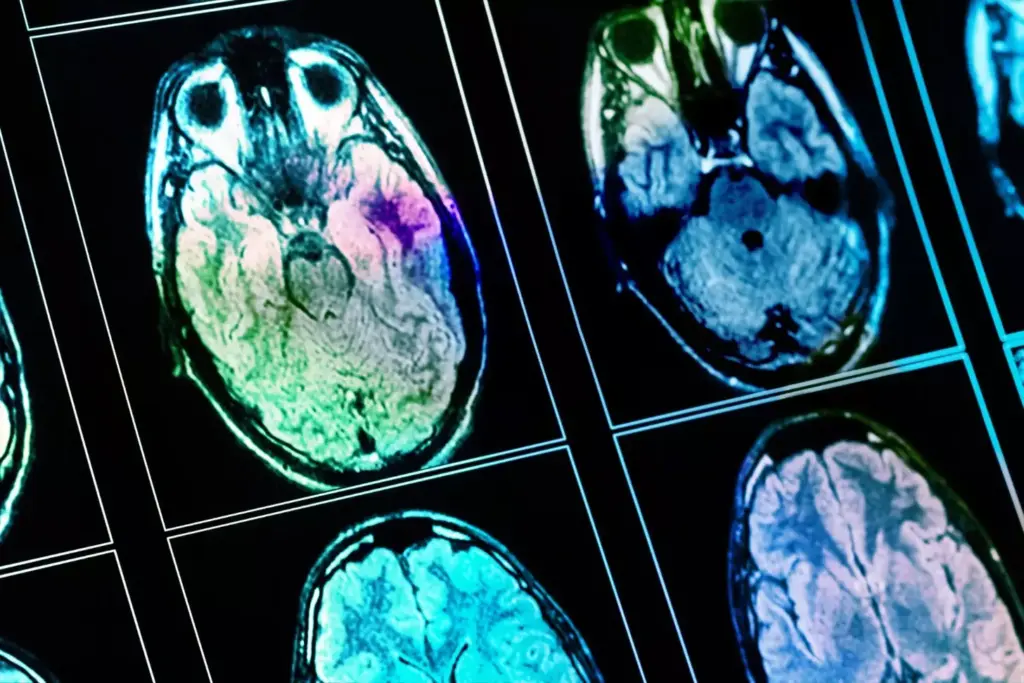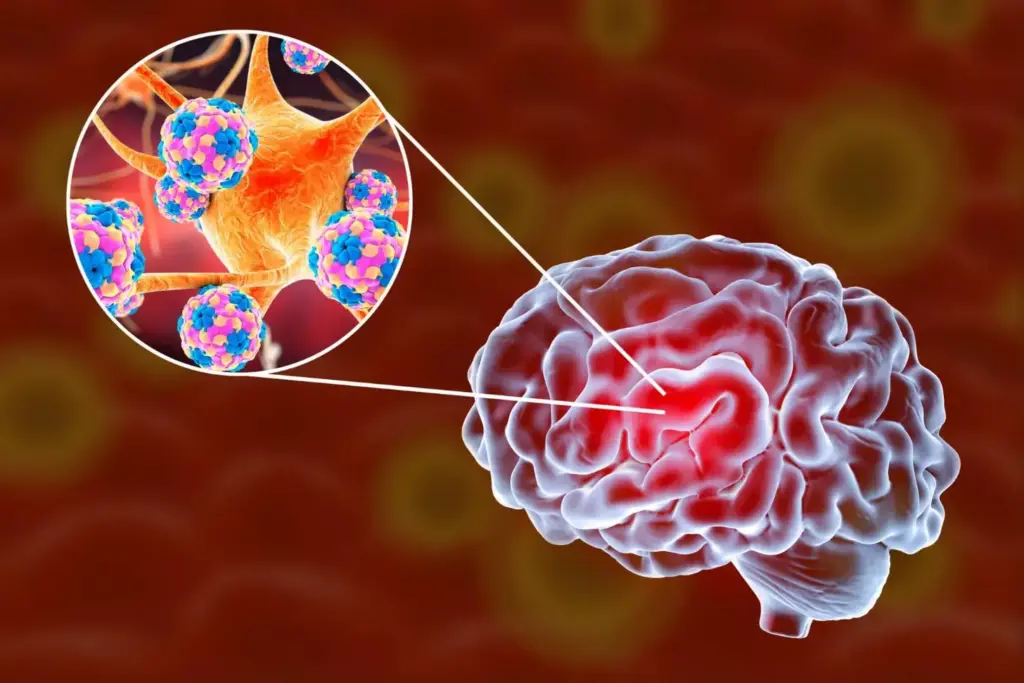
Recognizing the early symptoms of a brain tumor is crucial, as each brain region produces different warning signs. At Liv Hospital, we are committed to providing world-class healthcare with complete support for international patients.
The location of a brain tumor plays a significant role in determining the symptoms a patient will experience. For instance, frontal lobe tumors can cause cognitive and motor function changes, while temporal lobe tumors may affect memory and language processing.
Understanding these symptoms is vital for early diagnosis and effective treatment. We will explore the various symptoms associated with brain tumors in different locations, including the frontal, temporal, occipital, parietal lobes, cerebellum, and brain stem.
Key Takeaways
- Early recognition of brain tumor symptoms is crucial for effective treatment.
- Brain tumor symptoms vary significantly based on the tumor’s location.
- Liv Hospital provides comprehensive care for international patients.
- Frontal lobe tumors can cause cognitive and motor function changes.
- Temporal lobe tumors may affect memory and language processing.
Understanding Brain Tumors and Their Impact

Understanding brain tumors requires a deep dive into their nature, types, and impact on the human body. We will explore the basics of brain tumors, including their classification and how their location within the brain influences the symptoms that patients experience.
What Are Brain Tumors and How They Develop
Brain tumors are abnormal cell growths in the brain. They can be benign or malignant. Benign tumors are non-cancerous and typically do not spread to other parts of the body. Malignant tumors, on the other hand, are cancerous and can invade surrounding brain tissue or spread to other parts of the central nervous system.
The exact cause of brain tumors is not fully understood, but research suggests that genetic mutations play a significant role. These mutations can be inherited or acquired due to environmental factors.
Primary vs. Secondary Brain Tumors
Brain tumors can be categorized into primary and secondary types. Primary brain tumors originate within the brain, whereas secondary brain tumors result from cancer cells spreading to the brain from other parts of the body.
Primary brain tumors can arise from different types of brain cells, including astrocytes, oligodendrocytes, and ependymal cells. The most common types of primary brain tumors are gliomas, meningiomas, and acoustic neuromas.
Secondary brain tumors, also known as metastatic brain tumors, are more common than primary brain tumors. They are a sign of advanced cancer and often indicate a poor prognosis.
How Location Determines Symptom Presentation
The location of a brain tumor is a critical factor in determining the symptoms that a patient will experience. Tumors can affect various cognitive, motor, and sensory functions depending on their location within the brain.
For instance, tumors located in the frontal lobe can affect motor function, personality, and decision-making abilities. In contrast, tumors in the temporal lobe can impact memory, language processing, and emotional regulation.
Understanding the relationship between tumor location and symptom presentation is crucial for developing effective treatment plans and improving patient outcomes.
General Brain Tumor Symptoms

While the location of a brain tumor influences its symptoms, there are general signs that many patients experience. These symptoms can be particularly challenging as they often overlap with other conditions, making diagnosis crucial.
Common Symptoms Regardless of Location
Some of the most common symptoms of brain tumors include headaches, nausea, vomiting, and seizures. These symptoms occur due to the tumor’s pressure on the brain or its surrounding structures. Headaches, for instance, are often worse in the morning and can be accompanied by vomiting. It’s essential for patients to be aware of these symptoms and discuss them with their healthcare provider.
Other general symptoms may include fatigue, confusion, and difficulty with concentration. These can significantly impact a patient’s quality of life and should be monitored closely.
When to Seek Immediate Medical Attention
If symptoms suddenly worsen, it is crucial to seek immediate medical attention. Sudden changes can indicate a serious development, such as increased intracranial pressure or tumor bleeding. Patients should be aware of their body’s changes and not hesitate to contact their healthcare provider.
At Liv Hospital, we emphasize the importance of timely medical care for brain tumor patients. Our team is dedicated to providing comprehensive support and treatment options tailored to each patient’s needs.
Frontal Lobe Tumor Symptoms
The frontal lobe, being a critical area of the brain, when affected by a tumor, can result in various cognitive, speech, and motor impairments. Tumors in this region can significantly impact an individual’s quality of life, affecting their ability to perform daily tasks, interact with others, and maintain their independence.
Cognitive and Executive Function Changes
Frontal lobe tumors can lead to significant changes in cognitive and executive functions. Patients may experience difficulties with planning, decision-making, and problem-solving. They may also exhibit changes in personality, such as becoming more apathetic or, conversely, more aggressive.
These cognitive changes can be subtle at first but may become more pronounced as the tumor grows. It’s essential for patients and their families to be aware of these potential changes to seek medical attention promptly.
Speech and Language Problems
Speech and language problems are common symptoms of frontal lobe tumors, particularly when the tumor is located in the left hemisphere. Patients may experience difficulties with speech production, known as Broca’s aphasia, or comprehension, known as Wernicke’s aphasia.
“The presence of a tumor in the frontal lobe can significantly affect an individual’s ability to communicate effectively, leading to frustration and isolation.” –Liv Hospital Specialist
Left Side Brain Tumor Symptoms in the Frontal Region
Left-sided frontal lobe tumors can lead to specific language processing difficulties. Patients may struggle to find the right words, follow conversations, or understand written or spoken language. Additionally, they may experience motor impairments on the right side of their body due to the tumor’s impact on the left hemisphere’s motor control areas.
| Symptom | Description |
|---|---|
| Speech difficulties | Problems with speech production or comprehension |
| Motor impairment | Weakness or paralysis on the right side of the body |
| Cognitive changes | Difficulties with planning, decision-making, and problem-solving |
Motor Function Impairment
Frontal lobe tumors can also affect motor function, leading to weakness, paralysis, or coordination problems. The specific motor impairments depend on the tumor’s location and size. Patients may experience difficulties with walking, balance, or performing fine motor tasks.
At Liv Hospital, our specialists are experienced in diagnosing and treating frontal lobe tumors. We use a comprehensive approach to address the complex needs of our patients, providing them with the best possible outcomes.
Temporal Lobe Tumor Symptoms
The temporal lobe plays a crucial role in processing memories and language, and tumors here can disrupt these functions. At Liv Hospital, we have seen patients experience a range of symptoms due to temporal lobe tumors, affecting their quality of life.
Memory Formation and Recall Issues
One of the primary symptoms of temporal lobe tumors is difficulty with memory formation and recall. Patients may struggle to remember recent events or learn new information. Memory issues can be particularly challenging, as they affect daily activities and personal relationships.
Language Processing Difficulties
Temporal lobe tumors, especially those on the left side, can lead to language processing difficulties. This can manifest as trouble finding the right words, following conversations, or understanding written or spoken language.
Seizure Patterns Specific to Temporal Tumors
Tumors in the temporal lobe are known to cause specific types of seizures. These can include aura symptoms, where patients experience unusual sensations before the seizure, and complex partial seizures, which can cause altered consciousness.
Left Temporal Tumor Manifestations
Left temporal lobe tumors are particularly associated with language processing challenges. Patients may experience aphasia, or difficulty with word-finding and comprehension. The left temporal lobe’s role in language processing makes tumors in this area especially impactful on communication skills.
| Symptom | Description | Impact on Patient |
|---|---|---|
| Memory Issues | Difficulty with memory formation and recall | Affects daily activities and personal relationships |
| Language Processing Difficulties | Trouble with word-finding, following conversations, or understanding language | Impacts communication and social interactions |
| Seizure Patterns | Specific types of seizures, including aura and complex partial seizures | Can cause altered consciousness and disrupt daily life |
Parietal Lobe Tumor Symptoms
The parietal lobe plays a crucial role in processing sensory information and managing spatial awareness; tumors in this area can lead to significant disruptions in these functions. At Liv Hospital, we understand the complexities of parietal lobe tumors and their impact on patients’ lives.
Sensory Processing Disruptions
Tumors in the parietal lobe can cause sensory processing disruptions, leading to difficulties in perceiving touch, temperature, and pain. Patients may experience numbness or tingling sensations in various parts of their body. These symptoms can significantly affect a patient’s quality of life, making everyday activities challenging.
Spatial Awareness and Navigation Problems
Parietal lobe tumors can also affect spatial awareness and navigation. Patients may have difficulty understanding their body’s position in space, leading to problems with coordination and balance. This can result in an increased risk of falls and other accidents.
Reading and Writing Difficulties
Furthermore, parietal lobe tumors can cause reading and writing difficulties. Patients may struggle with tasks such as reading, writing, and even simple arithmetic due to the tumor’s impact on cognitive functions. We at Liv Hospital are committed to providing comprehensive care to address these challenges.
We recognize that each patient’s experience with parietal lobe tumors is unique, and our team is dedicated to providing personalized care and support. By understanding the symptoms associated with these tumors, we can develop effective treatment plans to improve patient outcomes.
Occipital Lobe Tumor: Visual Disturbances and Recognition Issues
The occipital lobe, responsible for processing visual information, is susceptible to tumors that cause significant visual impairments. Tumors in this area can lead to a variety of visual disturbances, affecting how patients perceive and interpret visual information. At Liv Hospital, we have encountered numerous cases where patients with occipital lobe tumors experience a range of visual symptoms that impact their daily lives.
Types of Visual Field Deficits
Visual field deficits are a common symptom of occipital lobe tumors. These deficits can manifest as:
- Homonymous hemianopia (loss of half of the visual field on the same side in both eyes)
- Quadrantanopia (loss of a quarter of the visual field)
- Blind spots or scotomas
These deficits occur because the tumor damages the visual pathways in the occipital lobe, affecting the patient’s ability to see objects or navigate spaces.
Visual Hallucinations and Illusions
Some patients with occipital lobe tumors may experience visual hallucinations or illusions. These can range from simple flashes of light to complex images. Visual hallucinations are perceptions in the absence of external stimuli, while illusions are misinterpretations of actual external stimuli.
“The occurrence of visual hallucinations in patients with occipital lobe tumors highlights the complexity of visual processing in the brain.”
Object and Face Recognition Problems
Tumors in the occipital lobe can also affect the ability to recognize objects and faces. This is due to the disruption of visual processing pathways that are crucial for identifying and interpreting visual stimuli.
Reading and Visual Processing Challenges
Patients may experience difficulties with reading and other visual processing tasks due to the tumor’s impact on visual perception. This can include challenges with:
- Recognizing written words
- Tracking lines of text
- Understanding visual information
Cerebellum Brain Tumor Symptoms
Tumors in the cerebellum, the part of the brain that controls coordination and balance, can lead to various distressing symptoms. The cerebellum plays a crucial role in motor control, and any disruption in this area can result in significant dysfunction.
Balance and Coordination Deterioration
One of the primary symptoms of cerebellar tumors is the deterioration of balance and coordination. Patients may experience difficulty in maintaining their posture or walking steadily. As a renowned neurosurgeon notes, “Cerebellar tumors can cause a significant decline in a patient’s motor skills, affecting their daily activities.”
“The impact of cerebellar tumors on balance and coordination can be quite profound, making everyday tasks challenging.”
Gait and Movement Abnormalities
Gait disturbances are common in patients with cerebellar tumors. These abnormalities can range from a slight limp to a complete loss of coordination. We observe that patients often have difficulty with fine motor tasks, such as writing or buttoning a shirt.
Nausea, Vomiting, and Headache Patterns
Nausea and vomiting are frequent complaints among patients with cerebellar tumors. These symptoms are often accompanied by headaches, which can be severe and debilitating. The headache patterns can vary, but they are typically persistent and may worsen over time.
Distinguishing Cerebellar Tumor Symptoms from Other Conditions
It’s essential to distinguish the symptoms of cerebellar tumors from other conditions that may present similarly. We use a combination of imaging studies and clinical evaluation to diagnose cerebellar tumors accurately. As noted in a recent study, “Early diagnosis is critical in managing cerebellar tumors effectively.”
At Liv Hospital, our team of specialists is experienced in diagnosing and treating cerebellar tumors. We provide comprehensive care to address the unique needs of each patient.
Brain Stem Tumor Symptoms
Understanding brain stem tumor symptoms is crucial for timely medical intervention. The brain stem is a vital part of our brain that connects the cerebrum to the spinal cord, playing a crucial role in controlling many of our body’s automatic functions, such as breathing, heart rate, and blood pressure.
Swallowing and Speech Difficulties
One of the critical symptoms of brain stem tumors is difficulty with swallowing, known as dysphagia. This occurs because the brain stem controls the nerves that regulate swallowing. Patients may also experience speech difficulties, including slurred speech or changes in voice quality, due to the impact on the cranial nerves responsible for speech production.
Double Vision and Eye Movement Problems
Brain stem tumors can cause double vision (diplopia) and other eye movement problems. This is because the brain stem houses the nuclei of cranial nerves that control eye movements. When these nerves are affected, it can lead to difficulties in moving the eyes in a coordinated manner, resulting in double vision or other visual disturbances.
Weakness and Sensory Changes
Weakness or numbness in various parts of the body can occur due to brain stem tumors. The brain stem is a critical pathway for motor and sensory signals between the brain and the rest of the body. Tumors in this area can compress or damage these pathways, leading to weakness, numbness, or tingling sensations.
Respiratory and Heart Rate Abnormalities
The brain stem regulates vital functions such as breathing and heart rate. Tumors in this area can disrupt these functions, leading to abnormalities in respiratory and heart rates. Patients may experience irregular breathing patterns, slowed or rapid heart rate, and other cardiovascular issues.
| Symptom | Description |
|---|---|
| Swallowing Difficulties | Dysphagia due to impact on cranial nerves controlling swallowing |
| Double Vision | Diplopia resulting from disruption of cranial nerves controlling eye movements |
| Weakness and Sensory Changes | Numbness or weakness due to compression of motor and sensory pathways |
| Respiratory Abnormalities | Irregular breathing patterns due to disruption of brain stem functions |
At Liv Hospital, we understand the critical nature of brain stem tumor symptoms and provide specialized care for patients experiencing these life-threatening conditions. Our team is dedicated to offering comprehensive support and treatment options tailored to each patient’s needs.
Conclusion: Recognizing Symptoms and Seeking Treatment
Recognizing brain tumor symptoms early is crucial for effective treatment and improved outcomes. At Liv Hospital, we are committed to providing world-class healthcare with complete support for international patients. Our team of specialists is dedicated to delivering personalized and comprehensive care for patients with brain tumors, ensuring the best possible outcomes.
If you or someone you know is experiencing symptoms of a brain tumor, we encourage you to seek medical attention promptly. Our experts are here to guide you through the diagnosis and treatment process, offering the latest advancements in brain tumor treatment. By seeking treatment for brain tumors at Liv Hospital, you can benefit from our internationally competitive care and state-of-the-art facilities.
Early detection and treatment can significantly impact the management of brain tumors. We are dedicated to supporting our patients every step of the way, from initial consultation to post-treatment care, as part of our Liv Hospital brain tumor treatment program.
FAQ
What are the common symptoms of brain tumors regardless of their location?
Common symptoms include headaches, nausea, vomiting, and seizures. These symptoms can worsen suddenly, and it’s crucial to seek medical attention if this happens.
How do frontal lobe tumors affect cognitive and executive functions?
Frontal lobe tumors can lead to changes in cognitive and executive functions, including difficulties with decision-making, planning, and problem-solving.
What are the symptoms of left-sided frontal lobe tumors?
Left-sided frontal lobe tumors can cause specific language processing difficulties and motor impairments on the right side of the body.
How do temporal lobe tumors affect memory and language processing?
Temporal lobe tumors can cause significant difficulties in memory formation and recall, as well as language processing challenges. Left temporal lobe tumors may lead to pronounced language processing difficulties.
What are the symptoms of parietal lobe tumors?
Parietal lobe tumors can lead to disruptions in sensory processing, resulting in difficulties with reading and writing, as well as spatial awareness and navigation problems.
How do occipital lobe tumors affect vision?
Occipital lobe tumors can cause a range of visual disturbances, including visual field deficits, hallucinations, and challenges with recognizing objects and faces.
What are the symptoms of cerebellar tumors?
Cerebellar tumors can lead to significant deterioration in balance and coordination, resulting in gait abnormalities and other movement issues, as well as nausea, vomiting, and headaches.
How do brain stem tumors affect vital functions?
Brain stem tumors can lead to severe and potentially life-threatening symptoms, including swallowing and speech difficulties, double vision, weakness, and significant changes in sensory perception.
What are the symptoms of a tumor in the cerebellum?
Symptoms of a tumor in the cerebellum include balance and coordination deterioration, gait abnormalities, nausea, vomiting, and headaches.
What are the symptoms of a left side brain tumor?
Symptoms of a left side brain tumor can include language processing difficulties, motor impairments on the right side of the body, and other cognitive and executive function changes, depending on the tumor’s location.
How do parietal lobe tumor symptoms manifest?
Parietal lobe tumor symptoms can manifest as disruptions in sensory processing, spatial awareness, and navigation, as well as difficulties with reading and writing.
What are the symptoms of an occipital lobe tumor?
Symptoms of an occipital lobe tumor include visual disturbances, such as visual field deficits, hallucinations, and challenges with recognizing objects and faces.
What are the symptoms of a frontal lobe tumor?
Symptoms of a frontal lobe tumor can include changes in cognitive and executive functions, speech and language problems, and motor function impairments.
How do brain tumors affect the body?
Brain tumors can affect various cognitive, motor, and sensory functions, depending on their location, and can lead to a range of symptoms, including headaches, nausea, vomiting, and seizures.








